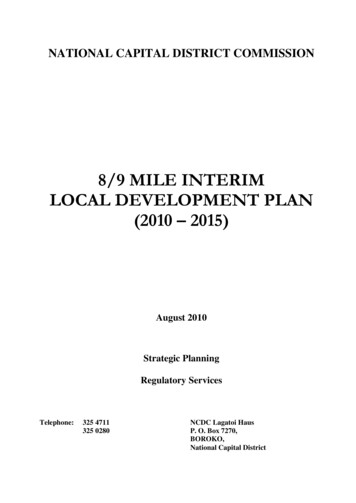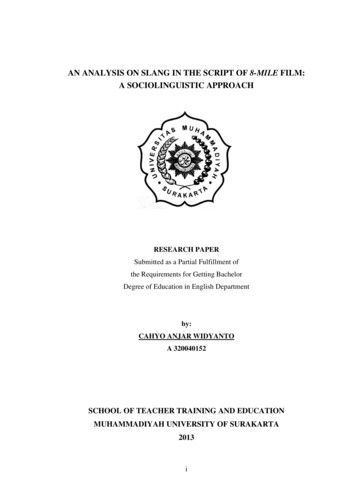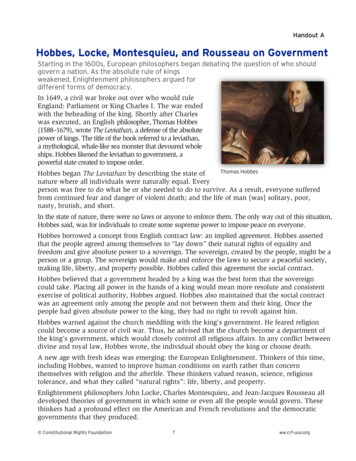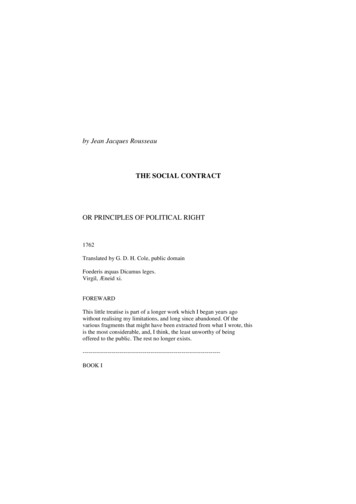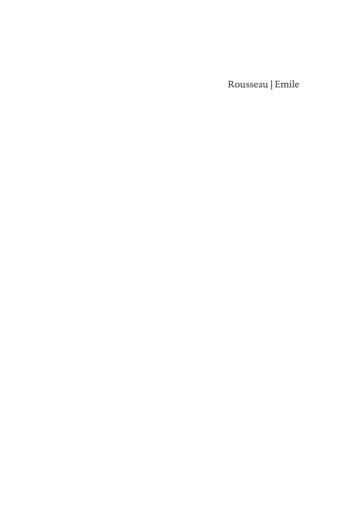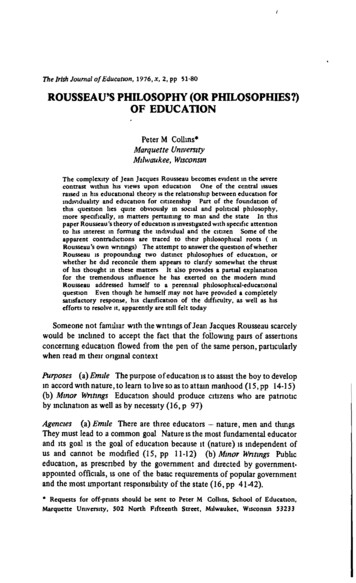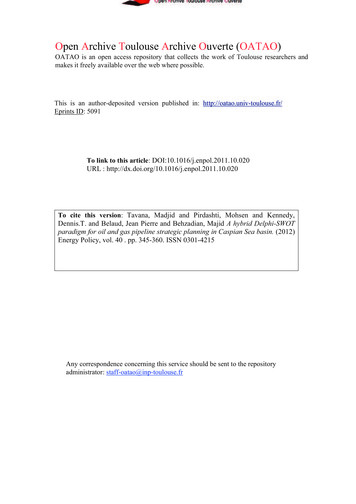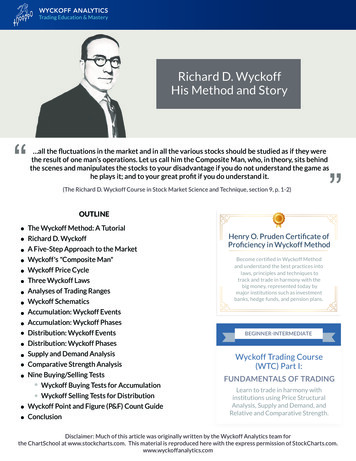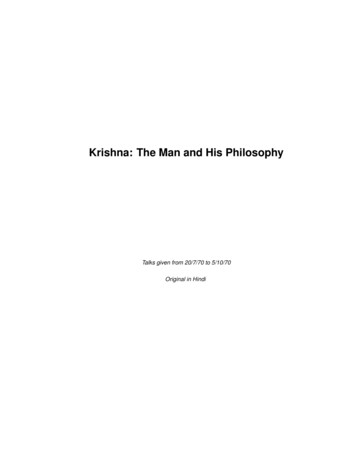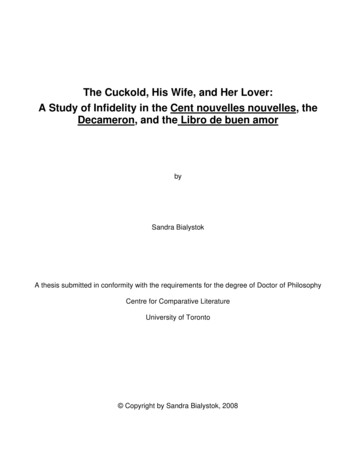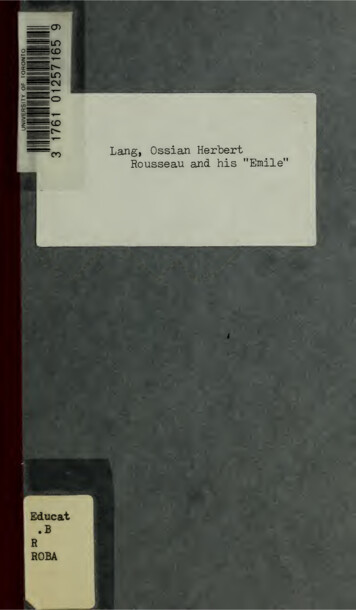
Transcription
c 1X1gi U- 1 t mXi o"C\J11o *" 5 /—IIS)s tr\3: "*COEducat.BRROBALang, Ossian HerbertRousseau and his "Emile"
Digitized by the Internet Archivein2010 with funding fromUniversity of ilOOIang
Rousseau and his "Emile."BYOSSIANH.LANG,AUTHOR OF "COMENIUS," "BASEDOW," "GREAT TEACHERS OFFOUR CENTURIES," ETC.NEW YORK AND CHICAGOE.L.KELLOGG &1893.CO.
Copyright,E. L.189a-KELLOGG &NEW YORK.ROUSSEAUCO.,
3E. L.SEND AliL ORDERS TOYORKCO.,NEWKELLOGG && CHICAGO.Jo. 2. Autobiography of Froebel.Materials to Aid a Comprehension of the Works of theFounder of the Kindergarten. 16mo, large, clear type,128 pp.toUnique paper cover. Price, 30 centsteachers, 24 cents by mail, 3 cents extra. Bound in limpcloth, 50 centsto teachers, 40 cents by mail, 5 centoextra.This little volume will be welcomed by all who want to getgood idea of Froebel and the kindergarten.1. The dates connected withFroebel and the kindergartenare given, then follows his;;;;autobiography.Tothisisadded Joseph Payne's estimate and portrayal of Froebel, as well as a summary ofFrcebel's own views.2. In this volume the student of education finds materials for constructing, in anintelligent manner an estimateand comprehension of the kindergarten. The life of Froebel,mainly by his own hand, isvery helpful. In this we seethe working of his mind whena youth he lets us see howFRIEDRICH FROEBEL.he felt at being misundercod, at being called a bad boy, and his pleasure when faceface with nature. Gradually we see there was crystallizinghim a comprehension of the means that would bring harLony and peace to the minds of young people.3. The analysis of the powers of Froebel will be of great"We see that there was a deep philosophy in this plainid.;)lerman man;he was studying out a plan by which theaually wasted years of young children could be made pro*active. The volume will be of great value not only to everyindergartner, but to all who wish to understand the philosohy of mental development.La. Journal of Education.— " An excellent little work. 1W. Va. School Journal.— " Will be of great value."Educational Courant, Ky.— " Ought to have a very extensive circution among the teachers of the country."Educational Record, Can.— Ought to he in the hands of every pr#4'*bionul teacher.
VALUABLE TEACHERS' BOOKSAT LOWPRICES.IReaoins Circle aLibrarg Series*Allen'sMind Studies for Young Teachers."Temperament in Education.Welch's Talks on Psychology.Hughes' Mistakes in Teaching."Securing Attention.Dewey's How to Teach Manners.Woodhull's Easy Experiments in Science.Calkins' Ear and Voice Training.Browning's Educational Theories.Autobiography of Froebel.Boundin cloth.Price 50 cents each; to teachers, 40 cents;by mail,5 centsextra.fteacbers' professional Hibrarg Series*Reinhart's History of Education.*'Principles of Education."Civics of Education.Blackie's Self-culture.Browning's Aspects of Education.Limpcloth.Price 25 cents each; to teachers, 20 cents; by mail, 3 ceLt?extra. eacbers'19.18.17.16.15.14.13.Allen's Historic Outlines of Education.Kellogg"s The Writing of Compositions.Lang's Comenius."Basedow.9.Series.Quick'sHowto Train theMem-ory.How to Keep8.Hughes'7.Huntington's Unconscious Tui-6.5.Gladstone's Object-teaching.Fitch's Improvement in the Aiof Teaching.4.Yonge's3.Sidgwick's2.School.Fitch's Art of Securing Attea1.Fitch's Art of Questioning.Order.tion.Kellogg's Pestalozzi.Carter's Artificial Production ofStupidity in Schools.McMurry's How to Conduct theRecitation.11.Groff's School Hygiene.Butler's Argument forTraining.10.Hoffmann's OnStimulustion.Gifts.Price 15 cents each; to teachers, 12 cents; by mail, 1 cent extra.descriptive catalogue of valuable books on teaching free on arrOur largeplication.E. L.KELLOGG &CO.,New Yorkand Chicago.
PREFACE.Rousseau was not aneducator.But he wasamangenius whose ideas have had a powerful effect onphilosophic thought. His masterly treatise on educaoftion, in particular, has given a stimulus topedagogicand more productive oftangible results than any other work on that subject.To be sure, Basedow was at work inaugurating a reformin educational life when this book appeared, but it isdoubtful whether he would have succeeded as well as heThe leaders ofdid had it not come to his support.thought, among them the profound Lessing and thelofty-minded Goethe, that were wont to satirize Basedowand ridicule his stormy agitations, were completely Avoninvestigation,moreforcibleover by Rousseau's " gospel of nature."Thephiloso-pher Kant, whose habits were said to be more regularthan the town-clock of Koenigsberg, sacrificed his dailywalks to con the pages of that wonderful book. Schillerwas inspired by it; and in the storm-and-stress movement that seized young Germany and occupied theirminds with day-dreams of political and philosophicalUtopia? till near the end of the last century, it was oneof the main sources.Pestalozzi, the founder of modernpedagogics, who boasted not to have read a book inseventeen years, drew his inspiration from the "Emile."In themovementfor educational regeneration that took3
Preface.4own countryourrise inideas were the foremostThis inafter the Revolution, Rousseau'samongthe dominant forces.should induce the student of educationto inquire who Rousseau was; what his ideas on education were, and why they produced so wonderful anitselfpotent reason.But there is another far moreRousseau's " Emile " is a master-workof child-study.The educator whoon the world.effectreadsitto get helpin this most difficult of his tasks, the investigation of thenature of children, their needs, desires, whims, in shortphysical and psychical constitution, willtheir wholemorethan he wouldfrom hundreds of other volumes bearing on this subject.Every educator, parents as well as teachers, ought toderivestudytionitreal, practical benefitwith this object in view.and discrimination to ghtly.impossible,requires cauItmuchcontainsthatisstudent would lose himself in the labyrinthhe should enter it unprepared./The primary aim of this monograph is to presentmerely the fundamental educational ideas of RousseauJ1 in a clear and simple manner, to point out their peda\gogic value, to show their effect on modern education,and to give a reasonable amount of information regardof thoughtifing hislifeand suchknownto understand his pedagogic theory.of hisworksas are necessary to beThedis-cussions of the foundation principles are of course in-tended rather as helpful suggestions than final decisions.Here the object has been to indicate fundamental errorsand thereby to assist the student to prepare himselfthoroughly for the reading the " Emile."
JEAN JACQUES ROUSSEAU.—JeanJacques Rousseau was bornHis birth caused the deathin Geneva, June 28, 1712.His father, a poor watchmaker,* taughtof his mother.Early Education.himand then, in order to provide plenty ofsame time to develop his extraordinarily acute talents, read novels and romances withThis sort of reading had a powerful effect on hishim.imagination, that source of his glory and his misery, butthey over-excited it and developed sensuality to such anextent that he remained the slave of his passions andsensuous desires ever after and never reached thatharmony, constancy, and determination in thought andaction which we call character.At the age of seven he received a number of moresubstantial books from the library of his grandfather,among them the works of Plutarch, which he soonpreferred to all others.Examples of great courage andto read,practiceandat theself-denial impressedhimdeeply.Heloved to imagine* Voltaire frequently referred to Rousseau as gargon dliorloger—watchmaker-boy.5
6Jean Jacques Rousseau.himself into themen andday while relatingattimes of which he read.Onetable the story of Scaevola, hefrightened his father by holding out his hand over thefire to illustrate the memorable deed of his hero.AtRousseau lost his father, who, owing to somesuddenly left Geneva never to return. Thismarked the beginning of his restless, adventurous lifethat earned him the name, "Bohemian of the eighteenth century."Roamings. At fourteen he was put to work in aneight,difficulties,—engraver's shop, but disliked the trade and ran away.Aftermanyaimless wanderings and escapades, he founda temporaryhomein the house of aMadamede Warens.This young, intelligent, and wealthy, but extremelysensuous woman engaged him as a servant at first, butsoon felt so great an interest in him that she had himeducated and became a mistress to him. Eousseau tookup Latin, the Port Royal logic, mathematics, drawing,music, and botany, prepared medicaments, and studiedthe works of Montaigne, Descartes, Malebranche, Locke,Leibnitz, probably also Rabelais and Rollin, and otherLosing Madame de Warens' favor, hewent to Lyons and was engaged as tutor for the twoboys of the Grand Prevot de Mably.Private Tutor. Rousseau was not at all qualified toeducate children. He possessed considerable knowledge,philosophers.—took a lively interest in his work, and was industriousand energetic in its performance, but he lacked prudence'and was much too impatient and wrathy to make asuccess of it.He employed only three means, viz.,appealing to the emotions of his pupils, reasoning, and
Jean Jacques Rousseau,wrath.wrote,7"As long as everything went smoothly/' he"and I saw that I accomplished something, Iwas the very devil if anything wentpupils did not understand me, I grewwas an angel, butIwrong.Ifmyexcited;ifthey were unruly, IThat certainlymake them learned and wise."then and there.themwas not the way tofelt like killing—Sends his Children to a Foundlings' Asylum. In 1741He gained a livelihood byRousseau went to Paris.copying music and writing operettas and comedies.*He united himself informally with Therese le Vasseur,a pretty, industrious, and warm-hearted, but extremelyignorant woman,who had beena bar-maid in Orleans,—vowing never to leave her, but also never to marryFive children were born. Deaf to the protesta*tions and imploring appeals of the unfortunate mother,Rousseau turned them all over to a foundlings' asylum,and even refused to take out papers of identification.His only excuse for this cruel and inhuman act washe did not want to have them grow up in the foulatmosphere of his domestic life.fher.t* He had invented an ingenious system of musical notation bymeans of figures, which he placed before the Academy, in IT 2.But instead of expected applause he received merely a moderateHis opera "Les Muses Gallautes " met with greaterpraise.-jor.Anallusion to the neglect of his parental duties is probablyfrom the " Emile." "I predict,"be writes, " to any one who has natural feeling and neglect*-madein the following passagethese sacred duties,— that he will long shed bitter tears overfault, and that for those tears he will rind no consolation."tl.-
8Jean Jacques Rousseau.Joins the Encyclop6distes.— He held for some time thepost of secretary to the ambassador to Venice.On hisreturn to Paris he got into the society of the celebratedEncyclopedistes,* was for a time an enthusiastic member of this materialistic circle and contributed to theencyclopedic work by writing the dictionary of musicandminor articles.Wins Fame by DenouncingtheseveralAcademyCivilized Life.— In1749of Dijon offered a prize for the best essayon the question, " Has the reconstruction of the sciencesand arts contributed to the purification of morals ?"Rousseau won the prize. He treated the subject negatively, at the advice of Diderot it seems, and tried toprove that the progress of civilization had corrupted themorals of mankind. Rome, he argued, was better inits infancy than later when she had conquered theworld science and art had degenerated the race.:Thediscourse caused a sensation in the literary world.Rousseau followed up his success by publishing (1753)another essay, on "The Origin of Inequality amongMen," in which he declared: " If nature has designed us*TheEncyclopedistes, so called because they published an en-cyclopedia of arts and sciences, were French freethinkers, who,starting out from a belief in a Supreme Being (deism), at length" inverted Bolingbroke's plan and instead of patronizing Provi'dence'did directly the opposite " and sought their salvation inthe rankest atheism.They hurledthe existence of spirituallife,defiance at all religion, deniedand explained that the soul wasmerely a sort of gaseous fluid of the body {extreme materialism)Diderot and d'Alembert were the most celebrated of the Encyclopedistes.
Jean Jacques Rousseau.9to be healthy, I almost venture to assert that the reflec-tive stateisisunnatural, and that theman whomeditatesHe compared the savage with theman, and decided in favor of the former. In-a depraved animal."civilizedequality withflown toit,allthe demoralizing influences that havehe declared, originated themomentthat anindividual fenced in a piece of land and dared to say,"this land belongs to me," and found people foolishenough to believe him. The man who undertook thiswas the founder of civic society. There would havebeen no wars and crimes, no misery and terror, if hehad met with opposition. Society created the State,and this led to the institution of political government.The dangerous power of legislation and administrationin public affairs was placed in the hands of a few whobecame the rulers of the people. The first step markedthe division between wealth and poverty; the second,between power and weakness; the third, between masterand servant.Innocence, simplicity, liberty, equality,and all the other blessings that mankind enjoyed in itsinfancy were thereby destroyed.tionroamed through theleft itsoriginal genera-openair,itself,andforests, slept in theparents as soon asknew nothingTheitcould shift forof the barriers of civilization that haveshut out innocent happiness and contentment.Theoriginal state
rousseauandhis"emile." by ossianh.lang, authorof"comenius,""basedow,""greatteachersof fourcenturies,"etc. newyorkandchicago e.l.kellogg&co. 1893.

